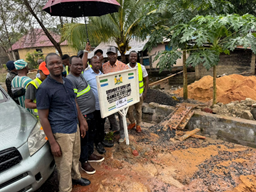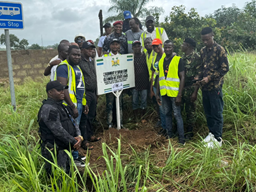By Mahmud Tim Kargbo
Ministry of Lands, Housing and Country Planning has issued Government Notice No. 371 in the Sierra Leone Gazette, Vol. CLXVI, No. 73, dated Thursday 28 August 2025. The notice invokes the Unoccupied Lands Act, Cap 117 of 1960 (http://sierralii.org/sl/legislation/act/1960/cap117) to authorise the repossession of unoccupied lands within the Newton to Songo corridor and surrounding areas.


The Public Notice calls on any individual or institution claiming ownership of any part of the designated parcels to submit documentary evidence to the Deputy Director of Surveys and Lands, Mr Abraham Cooper, between 1 September 2025 and 28 February 2026. Claimants must obtain an acknowledgement receipt upon submission, and liaise directly with Mr Cooper to prevent disputes during the authentication of their documents.
The Gazette also publishes the Newton to Songo Colony and Environs Boundary Schedule (Plot 1), Schedule Block 1, setting out precise beacon bearings, distances, and GPS coordinates defining the affected territory. Citizens are advised to consult the full Gazette notice at the Government Printing Press, 14 Howe Street, Freetown, for the complete schedule.


The areas concerned encompass large tracts across 47 communities, including Kallie Town, Brama, Newton, Madonkeh, Rogbom, Mamango, Maba, Masoko, Mayembana, Robis, Maseleh, Makonkodeh, Masella, Konta, Kwama, Rogere, Gbonkowaylay, Mafullah, Fabaina, Mahena, Ngarahun, Malamana, Masorie, Robonga, Rokundoh, Maselor, Magbagba, Mapoponi, Songo Loko, Mabala, Crossing, Foya, Masita, Makrifoh, Mabatama, Makolbondo, Magbaft, Five Mile, Six Mile, Katu Town, Kporbu, Gbowela, Maswaray, Gbovenhum, Makono, Mapakira and Magbanamaty. Settlements with evidence of more than twelve years of continuous occupation will be exempt, in line with the Act.
- Schedule One: 25,000 hectares in the Newton to Songo axis, with GPS coordinates published in the Gazette.
- Schedule Two: Additional adjoining parcels, also precisely demarcated.
President Julius Maada Bio has stressed his government’s resolve to ensure the repossession process is carried out strictly in accordance with the law, balancing state authority with the protection of citizens’ rights. This position reflects his broader commitment to good governance and institutional discipline under the SLPP’s “Big Five” agenda.
The government’s approach aligns with recommendations of the Truth and Reconciliation Commission, which identified land mismanagement, impunity, and weak enforcement of property rights as underlying causes of social grievances. By pursuing reform through a transparent and rules-based process, the administration aims to rectify historic injustices while rebuilding trust in public institutions.
Legal Context
Under Cap 117, land is deemed unoccupied if it is not lawfully occupied by any person. Continuous occupation through building, farming, water storage, or industrial use for twelve years or more is sufficient to establish lawful possession. (Source: http://sierralii.org/sl/legislation/act/1960/cap117)
Six-Month Deadline
In compliance with the law, the Ministry has set a six-month notice period, from 1 September 2025 to 28 February 2026. All claimants must present supporting documents to Mr Abraham Cooper, who will issue a receipt with a unique identification code.
For occupants without formal documents, but with long-term residence, the Ministry has pledged to regularise their tenure through State Land Grants rather than leases. However, documents signed by local Headmen will not be accepted, following the 2019 Miatta Conference Agreement, in which Headmen formally acknowledged their lack of legal authority to issue land titles.
Verification and Technology
Verification will rely on decades of satellite imagery and other methods. “We have multiple ways to validate claims. Satellite imagery provides year-by-year proof. Claimants should be prepared for rigorous scrutiny,” explained Tamba Sahr Dauda, Acting Professional Head and Director of Surveys and Lands. He added: “If you have built on the land and we can prove beyond reasonable doubt that you were there for more than twelve years, your building will remain with you. The same applies if you are cultivating plantations or storing water. We are strictly adhering to the law.”
After February 2026
Once the deadline expires, all unclaimed lands will be surveyed and registered as State Land. Any unauthorised occupation thereafter will constitute trespass and will be punishable under Sierra Leonean law, including potential fines or imprisonment. Enforcement will involve the Sierra Leone Police and the Office of the Attorney General.
Broader Context
Land disputes have long been a source of conflict in Sierra Leone, especially in the Western Area, where rapid urbanisation and population growth have sharply increased land values. The government hopes that invoking the Act will help regularise ownership, curtail fraudulent sales, and secure public lands for national development.
Minister Turad Sanesie, Minister of Lands, Housing and Country Planning, emphasised: “We are providing adequate time and clear procedures. Genuine claimants will be protected, but unoccupied land must be returned to the people of Sierra Leone through the State.”
Quick Guide
- The Unoccupied Lands Act was enacted in 1960 during colonial administration.
- Defines unoccupied land as land “not in lawful occupation.”
- Twelve years of continuous building, farming, water storage, or industrial use constitutes occupation.
- Notices must be published for six months before repossession.
- All unclaimed land automatically reverts to the State.
References
Unoccupied Lands Act, Cap 117 (1960). SierraLII. Available at: http://sierralii.org/sl/legislation/act/1960/cap117
Ministry of Lands, Housing and Country Planning. Public Gazette Notice (September 2025). [Insert Gazette URL when available]
Miatta Conference Agreement (2019). Ministry of Lands, Housing and Country Planning. [Insert link when available]